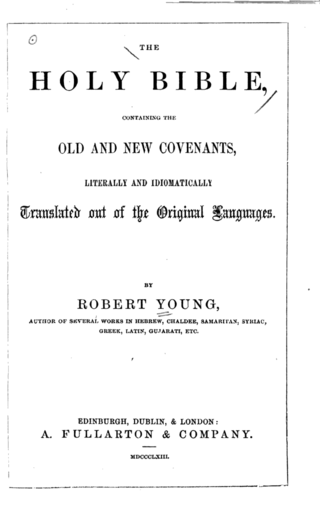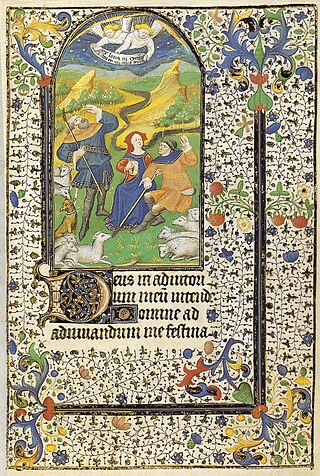Related Research Articles

The Epistle to the Romans is the sixth book in the New Testament, and the longest of the thirteen Pauline epistles. Biblical scholars agree that it was composed by Paul the Apostle to explain that salvation is offered through the gospel of Jesus Christ.

The Lord's Prayer, also known by its incipit Our Father, is a central Christian prayer that Jesus taught as the way to pray. Two versions of this prayer are recorded in the gospels: a longer form within the Sermon on the Mount in the Gospel of Matthew, and a shorter form in the Gospel of Luke when "one of his disciples said to him, 'Lord, teach us to pray, as John taught his disciples'". Regarding the presence of the two versions, some have suggested that both were original, the Matthean version spoken by Jesus early in his ministry in Galilee, and the Lucan version one year later, "very likely in Judea".
William Tyndale was an English Biblical scholar and linguist who became a leading figure in the Protestant Reformation in the years leading up to his execution. He translated much of the Bible into English, and was influenced by the works of prominent Protestant Reformers such as Martin Luther.

Myles Coverdale, first name also spelt Miles, was an English ecclesiastical reformer chiefly known as a Bible translator, preacher and, briefly, Bishop of Exeter (1551–1553). In 1535, Coverdale produced the first complete printed translation of the Bible into English. His theological development is a paradigm of the progress of the English Reformation from 1530 to 1552. By the time of his death, he had transitioned into an early Puritan, affiliated to Calvin, yet still advocating the teachings of Augustine.
The word anathema has two main meanings. One is to describe that something or someone is being hated or avoided. The other refers to a formal excommunication by a church. These meanings come from the New Testament, where an Anathema was a person or thing cursed or condemned by God. In the Old Testament, an Anathema was something or someone dedicated to God as a sacrifice, or cursed and separated from God because of sin. These represent two types of settings, one for devotion, the other for destruction.
Thorn in the flesh is a phrase of New Testament origin used to describe an annoyance, or trouble in one's life, drawn from Paul the Apostle's use of the phrase in his Second Epistle to the Corinthians 12:7–9:
And lest I should be exalted above measure through the abundance of the revelations, there was given to me a thorn in the flesh, the messenger of Satan to buffet me, lest I should be exalted above measure. 8 For this thing I besought the Lord thrice, that it might depart from me. 9 And he said unto me, My grace is sufficient for thee: for my strength is made perfect in weakness. Most gladly therefore will I rather glory in my infirmities, that the power of Christ may rest upon me. (KJV)
Christian anarchism is a Christian movement in political theology that claims anarchism is inherent in Christianity and the Gospels. It is grounded in the belief that there is only one source of authority to which Christians are ultimately answerable—the authority of God as embodied in the teachings of Jesus. It therefore rejects the idea that human governments have ultimate authority over human societies. Christian anarchists denounce the state, believing it is violent, deceitful and idolatrous.

The Douay–Rheims Bible, also known as the Douay–Rheims Version, Rheims–Douai Bible or Douai Bible, and abbreviated as D–R, DRB, and DRV, is a translation of the Bible from the Latin Vulgate into English made by members of the English College, Douai, in the service of the Catholic Church. The New Testament portion was published in Reims, France, in 1582, in one volume with extensive commentary and notes. The Old Testament portion was published in two volumes twenty-seven years later in 1609 and 1610 by the University of Douai. The first volume, covering Genesis to Job, was published in 1609; the second, covering the Book of Psalms to 2 Maccabees plus the three apocryphal books of the Vulgate appendix following the Old Testament, was published in 1610. Marginal notes took up the bulk of the volumes and offered insights on issues of translation, and on the Hebrew and Greek source texts of the Vulgate.
Early Modern English Bible translations are those translations of the Bible which were made between about 1500 and 1800, the period of Early Modern English. This was the first major period of Bible translation into the English language including the King James Version and Douai Bibles. The Reformation and Counter-Reformation led to the need for Bibles in the vernacular with competing groups each producing their own versions.

Young's Literal Translation (YLT) is a translation of the Bible into English, published in 1862. The translation was made by Robert Young, compiler of Young's Analytical Concordance to the Bible and Concise Critical Comments on the New Testament. Young used the Textus Receptus (TR) and the Masoretic Text (MT) as the basis for his translation. He wrote in the preface to the first edition, "It has been no part of the Translator's plan to attempt to form a New Hebrew or Greek Text—he has therefore somewhat rigidly adhered to the received ones." Young produced a "Revised Version" of his translation in 1887, but he stuck with the Received Text. He wrote in the preface to the Revised Edition, "The Greek Text followed is that generally recognized as the 'Received Text,' not because it is thought perfect, but because the department of Translation is quite distinct from that of textual criticism, and few are qualified for both. If the original text be altered by a translator, the reader is left in uncertainty whether the translation given is to be considered as that of the old or of the new reading." A new Revised Edition was released ten years after Robert Young's death on October 14, 1888. The 1898 version was based on the TR, easily confirmed by the word "bathe" in Revelation 1:5 and the word "again" in Revelation 20:5. The "Publishers' Note to the Third Edition" explains, "The work has been subjected to a fresh revision, making no alteration on the principles on which the Translation proceeds, but endeavouring to make it as nearly perfect in point of accuracy on its present lines as possible." A major revision of Young's Literal Translation in contemporary English, called the Literal Standard Version, was released in 2020.

Consecration is the transfer of a person or a thing to the sacred sphere for a special purpose or service. The word consecration literally means "association with the sacred". Persons, places, or things can be consecrated, and the term is used in various ways by different groups. The origin of the word comes from the Latin stem consecrat, which means dedicated, devoted, and sacred. A synonym for consecration is sanctification; its antonym is desecration.
Higher Power is a term used in Alcoholics Anonymous (AA) and other twelve-step programs. The same groups use the phrases "a power greater than ourselves" and "God of our understanding" synonymously. The term is intentionally vague because the program is not tied to a particular religion or spiritual tradition; members may use it to refer to any supreme being or deity, another conception of God, or even non-supernatural things such as the twelve-step program itself.

"Render unto Caesar" is the beginning of a phrase attributed to Jesus in the synoptic gospels, which reads in full, "Render unto Caesar the things that are Caesar's, and unto God the things that are God's".

The Tyndale Bible (TYN) generally refers to the body of biblical translations by William Tyndale into Early Modern English, made c. 1522–1535. Tyndale's biblical text is credited with being the first Anglophone Biblical translation to work directly from Hebrew and Greek texts, although it relied heavily upon the Latin Vulgate and Luther's German New Testament. Furthermore, it was the first English biblical translation that was mass-produced as a result of new advances in the art of printing.

Psalm 62 is the 62nd psalm of the Book of Psalms, beginning in English in the King James Version: "Truly my soul waiteth upon God: from him cometh my salvation". The Book of Psalms is part of the third section of the Hebrew Bible, and a book of the Christian Old Testament. In the slightly different numbering system used in the Greek Septuagint version of the Bible and in the Latin Vulgate, this psalm is Psalm 61. In Latin, it is known as "Nonne Deo subiecta erit anima mea". The psalm offers a warning not to let one's power erode one's trust in God.

Psalm 70 is the 70th psalm of the Book of Psalms, beginning in English in the King James Version: "Make haste, O God, to deliver me". The Book of Psalms is part of the third section of the Hebrew Bible, and a book of the Christian Old Testament. In the slightly different numbering system used in the Greek Septuagint and Latin Vulgate translations of the Bible, this psalm is Psalm 69. In Latin, it is known as "Deus, in adiutorium meum intende".

Psalm 71 is the 71st psalm of the Book of Psalms, beginning in English in the King James Version: "In thee, O LORD, do I put my trust: let me never be put to confusion". It has no title in the Hebrew version. In the slightly different numbering system used in the Greek Septuagint and Latin Vulgate translations of the Bible, this psalm is Psalm 70. In Latin, it is known as "In te Domine speravi".
Christian theology is the theology – the systematic study of the divine and religion – of Christian belief and practice. It concentrates primarily upon the texts of the Old Testament and of the New Testament, as well as on Christian tradition. Christian theologians use biblical exegesis, rational analysis and argument. Theologians may undertake the study of Christian theology for a variety of reasons, such as in order to:
The Obedience of a Christen man, and how Christen rulers ought to govern, wherein also thou shalt find eyes to perceive the crafty convience of all iugglers. is a 1528 book by the English Protestant author William Tyndale. The spelling of this title is now commonly modernized and abbreviated to The Obedience of a Christian Man. It was first published by Merten de Keyser in Antwerp, and is best known for advocating Caesaropapism: the ideology that the King of a country was the head of that country's church, rather than the Holy See, and to be the first instance, in the English language at any rate, of advocating the divine right of kings, a concept mistakenly attributed to the Catholic Church.
Exousia is an Ancient Greek word used in the New Testament, the exact meaning of which is debated by scholars but is generally translated as "authority". Paul the Apostle wrote that a woman should have exousia "on [or perhaps 'over'] her head", but the meaning of the passage is not clear.
References
- ↑ "powers that be". The Free Dictionary. Farlex. 2011. Retrieved June 5, 2016.
- ↑ Tyndale, William (1526). Tyndale Bible. Archived from the original on September 27, 2013.
- ↑ Archived December 18, 2014, at the Wayback Machine
- ↑ "The powers that be - meaning and origin". Phrases.org.uk. Retrieved June 2, 2015.
- ↑ "powers that be - definition of powers that be by The Free Dictionary". Thefreedictionary.com. March 1, 1987. Retrieved June 2, 2015.
- ↑ Biblos.com. Chain Link Bible. Romans 13:1.